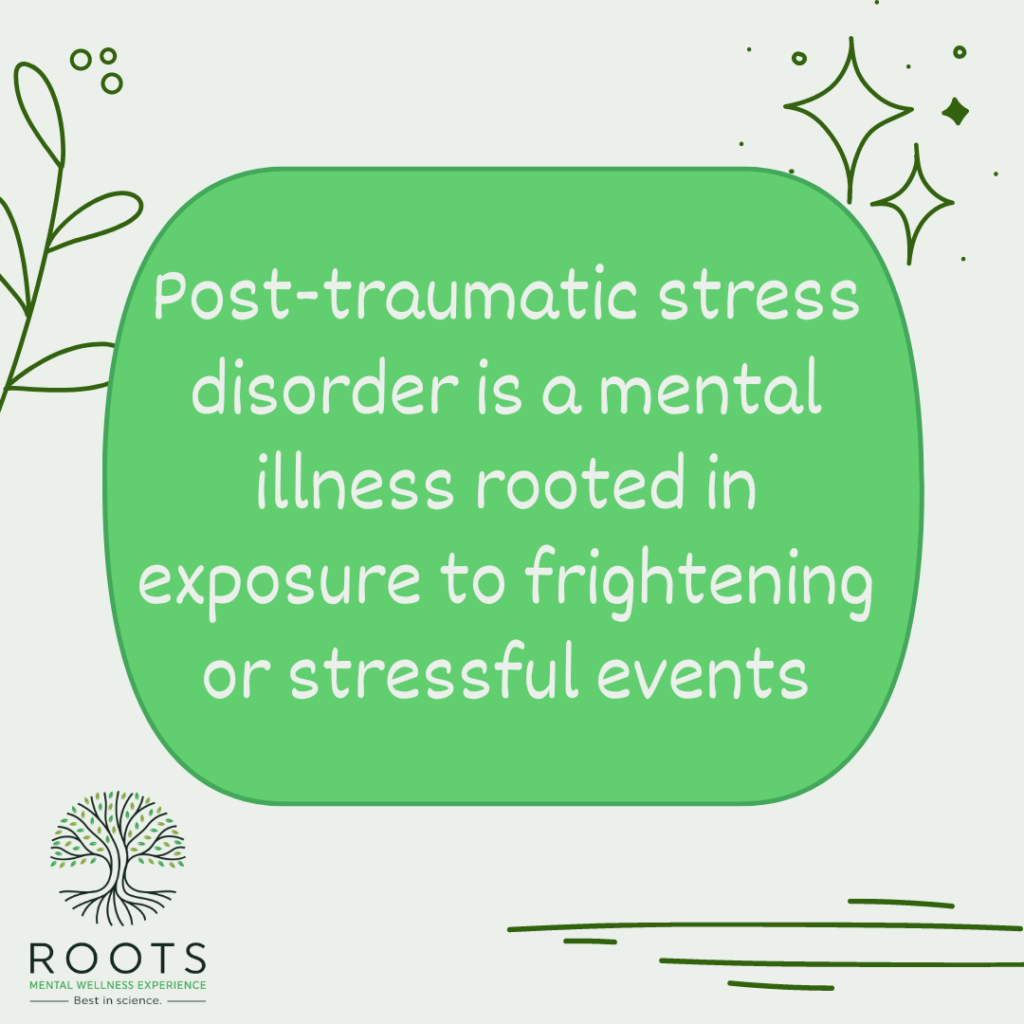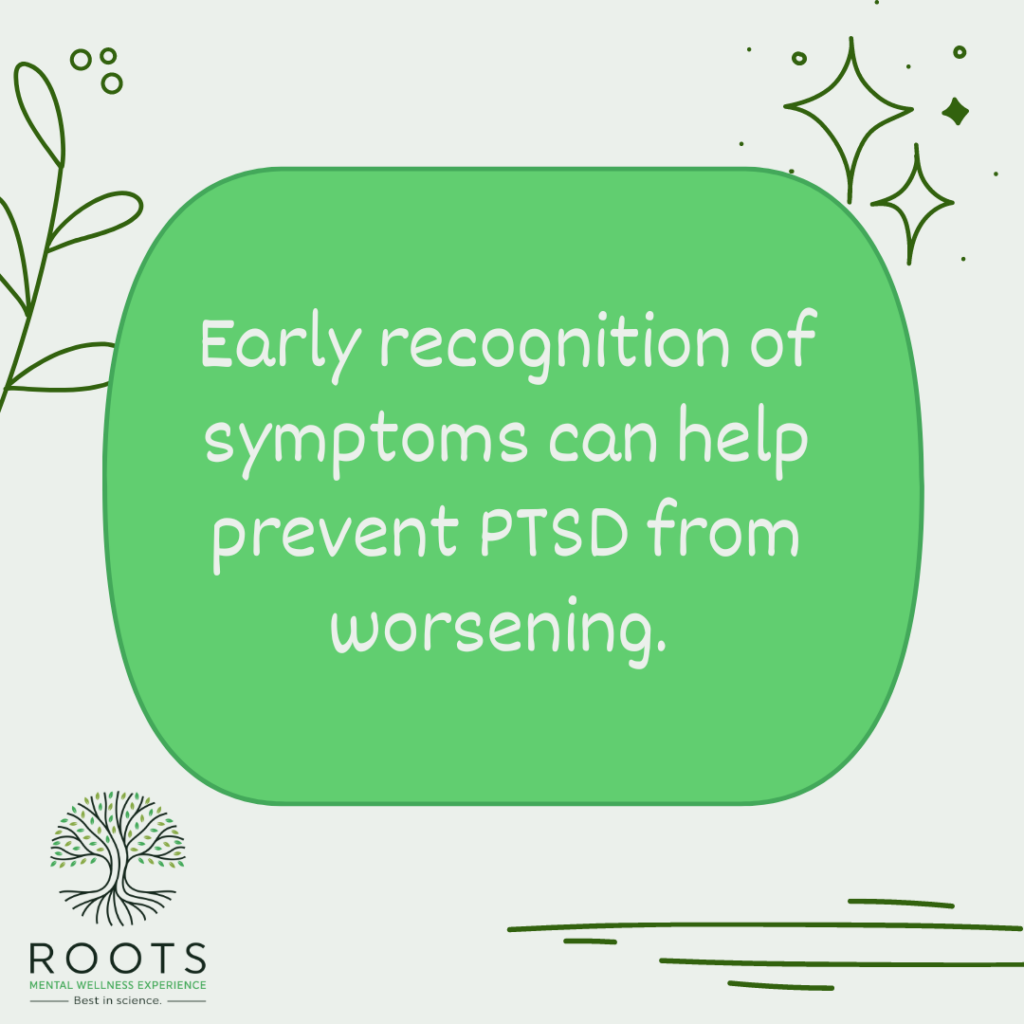Post-traumatic stress disorder is a mental illness rooted in exposure to frightening or stressful events, such as abuse, violence, serious health problems, natural disasters, and war. People with PTSD illness may struggle to cope with distressing feelings associated with trauma.
In this blog, we will discuss what PTSD is in detail, along with its causes and symptoms. We will also offer guidance on treatments for those dealing with it. With proper help, individuals with PTSD can learn effective coping strategies and experience reduced symptoms, allowing them to live more fulfilling lives.

What is PTSD?
Post Traumatic Stress Disorder occurs after a person experiences a horrifying event that usually involves violence, the threat of harm, or death. It can result in symptoms such as flashbacks, nightmares, emotional dysregulation, and sleep disturbances. PTSD attacks can make it difficult for individuals to go about their lives and often create feelings of fear and helplessness.
Common Causes of PTSD Illness and Other Risk Factors
PTSD can be triggered by the following events:
- Combat and War: Military personnel who have experienced combat, either directly or indirectly
- Physical or sexual assault: Survivors of physical or sexual assault, including domestic violence
- Natural disasters: Survivors of natural disasters, such as earthquakes, hurricanes, floods, and wildfires
- Serious accidents: People who have been involved in serious accidents, such as car crashes or plane crashes
- Medical trauma: Patients who have undergone major medical procedures or treatments, such as surgery, chemotherapy, or radiation therapy
- Childhood abuse or neglect: Adults who experienced childhood abuse or neglect
- Terrorism and mass violence: People who have been directly or indirectly affected by acts of terrorism or mass violence
- Sudden loss of a loved one: People who have experienced the sudden loss of a loved one, such as through suicide or homicide
There are also risk factors that further contribute to the likelihood of developing PTSD illness. This includes:
- Failure to receive adequate support during or after the event: Lack of support, empathy, or resources after a traumatic event can worsen the symptoms of PTSD or delay recovery.
- Being wounded physically or psychologically: Physical injuries, such as those sustained in combat or a serious accident, and psychological wounds, such as emotional or verbal abuse, can contribute to developing this condition.
- Prolonged exposure to a hazardous environment: People who work in hazardous occupations or live in dangerous environments, such as emergency responders or individuals in war zones, are more susceptible to developing PTSD due to prolonged exposure to trauma.
- Having pre-existing mental health issues: Individuals with depression or anxiety disorders may also be at a higher risk of developing PTSD.

Signs Of PTSD Illness To Watch Out For
People with PTSD can experience the following symptoms:
- Intrusive thoughts, memories, or flashbacks of the traumatic event
- Avoidance of places, people, or things that remind the person of the trauma
- Hypervigilance or constantly feeling on guard, easily startled or frightened
- Adverse changes in mood or thought patterns, such as feelings of guilt, shame, or despair
- Difficulty sleeping, including nightmares or insomnia
- Panic attacks or outbursts of anger
- Feeling emotionally numb or disconnected from others
- Difficulty concentrating or remembering things
- Increased use of drugs or alcohol as a way to cope with symptoms
If any of these indicators are present or have become more severe, seeking help is crucial. Early recognition of symptoms can help prevent PTSD from worsening.
Treatment Options Available For PTSD
If you are experiencing any of the signs listed above, consider the following treatment options.
Medication-based Treatments
Commonly prescribed drugs for PTSD treatment include:
- SSRIs (selective serotonin reuptake inhibitors) and SNRIs (serotonin-norepinephrine reuptake inhibitors) work by increasing the levels of neurotransmitters in the brain. It helps regulate mood, reduce anxiety, and improve sleep. The four SSRIs/SNRIs that are recommended for the treatment of PTSD are:
- sertraline (Zoloft)
- paroxetine (Paxil)
- fluoxetine (Prozac)
- venlafaxine (Effexor)
- Nefazodone (Serzone) is a serotonin reuptake inhibitor (SRI) that changes the levels and activity of naturally occurring chemical signals in the brain.
- Imipramine (Tofranil) is a tricyclic antidepressant (TCA) that alters naturally occurring chemicals to help brain cells communicate and can lift the mood.
- Phenelzine (Nardil) blocks the activity of an enzyme that breaks down chemical messengers in the brain, such as serotonin, norepinephrine, and dopamine. It helps alleviate symptoms of depression and anxiety.
- Benzodiazepines, like Xanax, are used to treat anxiety and panic disorders and may be prescribed for short-term relief of symptoms.

Psychotherapy-based Treatments
Here are some common types of psychotherapy used in the treatment of PTSD illness.
- Cognitive Processing Therapy (CPT) – It helps individuals identify, understand, challenge, and accept the effects of difficult experiences to move forward in their healing journey.
- Trauma-Focused Cognitive Behavioral Therapy (TF-CBT) – Therapists work closely with patients to understand their experiences better, identify their cognitive distortions and unhealthy coping behaviors, and replace them with healthier ones.
- Dialectical Behavioral Therapy – It utilizes principles such as emotional regulation, distress tolerance, and interpersonal effectiveness to help individuals process their trauma positively and constructively.
- Eye Movement Desensitization and Reprocessing (EMDR) – It stimulates both brain sides through rhythmic eye movements. Meanwhile, the patient focuses on a target thought or memory, allowing it to be reprocessed. EMDR therapy successfully treats symptoms ranging from intrusive thoughts to physical pain.
- Prolonged Exposure (PE) – It gradually exposes the patient to their trauma, which could be through talking, imagery, or even virtual reality. This therapy reduces fear, decreases flashbacks and nightmares, and improves overall emotional stability.
Complementary and Alternative PTSD Treatments
People living with post-traumatic stress disorder may find other treatments beyond traditional methods beneficial. Complementary and alternative therapies that promote physical, emotional, and spiritual healing include:
- Acupuncture
- Meditation
- Music and guided imagery
- Relaxation techniques
- Yoga

Self-care and Lifestyle Changes
Self-care can also be a powerful tool in managing trauma and its effects. To support your healing journey, here are some strategies you can implement in your daily life:
- Develop healthier relationships with your friends, family, and romantic partner
- Do mindfulness practices like yoga or journaling
- Engage in leisure activities, such as playing sports, reading, or spending time outdoors
- Connect with professionals who specialize in trauma for support and guidance
PTSD is a complex mental health condition that can impact one’s well-being. However, with proper treatment and support, people can overcome symptoms and improve their quality of life. No one needs to do this alone – medications, psychotherapy, complementary and alternative treatments, and self-care can help manage it.
Roots Through Recovery has its doors open for individuals who have PTSD illness. Our treatment center can provide the resources and support needed to find your way out of darkness and into a space of safety, security, and healing.



